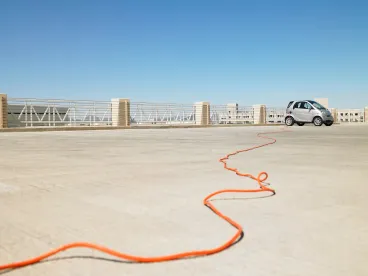As part of a package of bills aimed at reducing the state’s greenhouse gas emissions, the 2019 Washington State legislature passed legislation that should accelerate the adoption of electric vehicles (EVs), as well as vehicles fueled with hydrogen and other alternative fuels.
The new legislation, along with three companion bills – the Washington Clean Energy Transformation Act , which requires Washington’s electric utilities to phase out greenhouse-gas emitting generation by 2045, a bill limiting emissions of hydrofluorocarbons (gases used in refrigeration and other industrial processes), and a bill imposing new energy efficiency requirements on commercial buildings – promise to profoundly change Washington’s energy consumption patterns over the next two to three decades.
The electric vehicle legislation took a rather unusual path. Initially, the legislature adopted SHB 1512 in April, which focuses primarily on utility electrification transportation plans. A more comprehensive bill, ESSB 2042 was adopted in May and includes amendments to SB 1512, extensions of several tax credits, and new grant and education programs. Together, the bills substantially change the landscape for EVs and other alternative-fueled vehicles in Washington.
Authority for Consumer-Owned Utilities to Adopt Electric Vehicle Programs
After several unsuccessful tries in previous sessions, the new legislation succeeded in providing explicit authority for municipally-owned utilities and Public Utility Districts to encourage adoption of EVs. The legislation broadly authorizes these public agencies to adopt “electrification of transportation” plans that encourage the electrified transportation options “across all customer classes.” This should remove any doubt about the authority of consumer-owned utilities to build EV charging infrastructure, encourage EV adoption by their customers, and otherwise to facilitate electrification of transportation.
The new bills authorize electrification plans that may include a broad range of measures to encourage electrification. In addition, the utility may consider demand response, dynamic pricing, indirect load control, and the pursuit of other system efficiencies. These provisions will allow utilities to, for example, encourage EV charging at night and at other times when system demand is low, thus minimizing the need for new infrastructure to meet EV charging demand. In addition, utilities will be able to integrate EV charging operations into load management programs by controlling when EVs are charged and even using EV batteries as a way to balance generation produced by intermittent resources such as wind and solar. As EV adoption expands, EVs could thus become an important load-balancing and energy storage resource for Washington’s consumer-owned utilities.
The legislation imposes only one major limitation on these programs: the costs of the programs may not increase “net costs to ratepayers in excess of one-quarter of one percent.” If EV loads are carefully managed by utilities, this limitation should not be a major barrier to adopting robust EV programs because the added loads created by EVs create a significant new source of revenue for utilities that, if new EV-related loads are carefully managed, can be accommodated by using existing transmission and distribution capacity.
Electric Vehicle Plans for Investor-Owned Utilities
The legislation also adopts expanded authority for the Utilities & Transportation Commission (UTC) to review and approve EV infrastructure and incentive plans for Washington’s regulated investor-owned utilities (IOUs). The legislation requires IOUs submitting electrification of transportation plans to align those plans with their existing planning horizon and broadly authorizes the deployment of EV charging infrastructure, incentives for EV adoption, and other services such as education. The UTC is given equally broad authority to acknowledge the electrification of transportation plans submitted by the IOUs.
The legislation retains the existing incentive for IOUs to invest in EV infrastructure, allowing an incentive rate of return of up to 2% on capital invested in EV supply equipment deployed for the benefit of ratepayers. However, those capital expenditures may not increase the utility’s annual retail revenue requirements by more than one-quarter of one percent after accounting for the revenue benefits of EV adoption.
New Grants and Assistance Programs Encourage Alternative-Fueled Vehicles
The new legislation authorizes two new grant programs that, if appropriations are forthcoming, could substantially aid the adoption of alternative-fueled vehicles. First, the legislation authorizes a new green transportation capital grant program that will support the conversion of public vehicle fleets to alternative fuels, including electricity, hydrogen, or fuel cells. Second, the legislation authorizes a new pilot program of grants to non-profit agencies, local governments, and housing authorities to provide low- and moderate-income workers who are not readily served by mass transit access to alternative-fueled vehicles through car-sharing programs or other similar programs.
The legislation also directs the WSU Extension Energy program to provide technical assistance and education to public agencies to assist in them in acquiring and operating alternative-fueled vehicle fleets.
Tax Benefits for EV and Alternative Fuel Adoption
The legislation also adopts, renews, or extends several major tax incentives for the purchase of EVs by businesses and individuals. First, the existing retail sales and use tax exemptions for EVs and other alternative-fuel vehicles are extended through 2025 and are expanded to include tax exemptions for batteries and other equipment sold as a component of an electric bus or bus fueled by another type of alternative fuel. The retail sales and use tax exemptions are also extended to battery-powered marine propulsion systems, recognition of promising new approaches to powering watercraft with alternative fuels.
Second, to encourage the conversion of commercial vehicle fleets, a tax credit for businesses who pay Washington’s Business & Occupancy tax is increased and extended, allowing a tax credit of up to fifty percent of the cost of purchasing alternative fuel vehicles, as well as the fueling infrastructure needed to fuel these vehicles.
Third, the existing exemption from leasehold excise taxes (taxes imposed on revenues from leases of public lands) is extended to 2025 and expanded to include hydrogen fueling and production facilities as well as EV charging infrastructure.
The West Coast as a Major New EV Market
Washington has already made significant progress in EV adoption: in 2015, Gov. Inslee set a goal of 50,000 EVs on the road by 2020 and, as of December 2018, 42,000 EVs were registered in the state. The new legislation should accommodate a much faster rate of adoption and, in combination with similar policies in Oregon and California, should make the West Coast a major market for EVs and other alternative-fueled vehicles.





 />i
/>i

